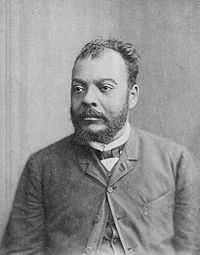José do Patrocínio
| José do Patrocínio | |
|---|---|
|
A photograph of José do Patrocínio | |
| Born |
José Carlos do Patrocínio October 9, 1854 Campos dos Goytacazes, Rio de Janeiro, Brazil |
| Died |
January 29, 1905 (aged 50) Rio de Janeiro City, Rio de Janeiro, Brazil |
| Pen name | Proudhomme, Notus Ferrão |
| Occupation | Writer, pharmacist, activist, orator, journalist |
| Nationality |
|
| Alma mater | Faculdade de Medicina da Universidade Federal do Rio de Janeiro |
| Notable works | Mota Coqueiro, ou A Pena de Morte |
| Spouse | Maria Henriqueta Sena |
José Carlos do Patrocínio (October 9, 1854 – January 29, 1905) was a Brazilian writer, journalist, activist, orator and pharmacist and among the most well-known proponents of the abolition of slavery.
He founded and occupied the 21st chair of the Brazilian Academy of Letters from 1897 until his death in 1905.
Life
José do Patrocínio was born in the city of Campos dos Goytacazes, to João Carlos Monteiro, a vicar and politician, and Justina do Espírito Santo, a young freed slave from Elmina, Ghana. João Carlos did not legally recognize his son, but he did partially subsidize his education in pharmacy school.[1]
After finishing school, Do Patrocínio went to Rio de Janeiro, where he served as a bricklayer during the construction of the Santa Casa da Misericórdia. He became interested in Medicine and began studying at the Faculdade de Medicina da Universidade Federal do Rio de Janeiro, graduating in Pharmacy 1874. However, Do Patrocínio could not find a home to live in after his graduation. A friend of his invited him to live in the neighborhood of São Cristóvão, where Do Patrocínio stayed at the house of a rich laird and captain named Emiliano Rosa Sena. Later entering to a Republican club, he met Quintino Bocaiuva, Lopes Trovão and Pardal Mallet, among others.
He soon fell in love with Sena's daughter, Maria Henriqueta, who he nicknamed "Bibi". Although Emiliano initially disapproved of the marriage, he later complied. Do Patrocínio married Bibi in 1879.
During this period, Do Patrocínio began his journalistic career. He founded, alongside Demerval da Fonseca, a journal named Os Ferrões (The Stings). Fonseca used the pen name Eurus Ferrão, while Do Patrocínio used Notus Ferrão.
In 1879, he became a contributing editor for the journal Gazeta de Notícias, where he wrote articles under the pen name Proudhomme. Within a short time his abolitionist writings increased the daily circulation of the paper from 2,000 to 12,000 copies.[1]
In 1880 he founded an Abolitionist society alongside Joaquim Nabuco. He and its members (such as André Rebouças and Aristides Lobo) were famous for buying manumissions for slaves.
In 1885, invited by Francisco de Paula Ney, he travelled to Ceará, where he was very well received. He was also well received when returned to Campos dos Goytacazes, where he took his mother to Rio de Janeiro, for her burial. Famous personalities, such as Ruy Barbosa, Rodolfo Epifânio de Sousa Dantas, Campos Sales and Prudente de Morais, attended the burial.
In 1889, with the Brazilian Proclamation of the Republic, he was a member of the Revolta da Armada of 1892, being exiled in Cucuí, in Amazonas.
He died in 1905, during a speech in honor of Alberto Santos-Dumont, due to an hemoptysis.
Works
- Mota Coqueiro, ou A Pena de Morte (1877)
- Os Retirantes (1879)
- Pedro Espanhol (1884)
Representations in popular culture
Do Patrocínio was portrayed by Antonio Pitanga in the 1969 telenovel Sangue do Meu Sangue, by Kadu Karneiro in its 1995 remake, by Valter Santos in the 1988 miniseries Abolição and by Maurício Gonçalves in the 1999 miniseries Chiquinha Gonzaga.
References
External links
| Preceded by Joaquim Serra (patron) |
Brazilian Academy of Letters - Occupant of the 21st chair 1897 — 1905 |
Succeeded by Mário de Alencar |
| ||||||||||||||||||||||||||||
| ||||||||||||||||||||
|

.svg.png)
